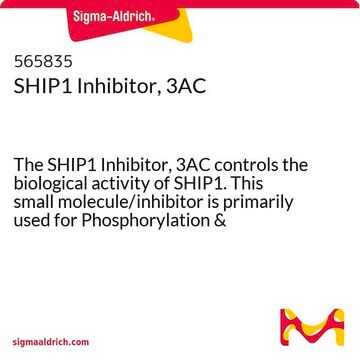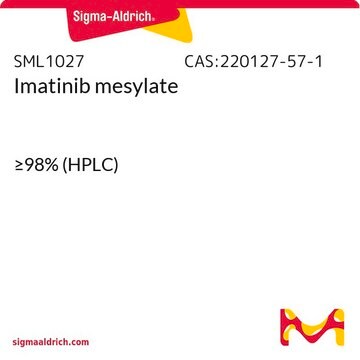565851
NSC-87877
≥97% (HPLC), solid, SHP1/2 PTPase inhibitor, Calbiochem®
Synonym(s):
SHP1/2 PTPase Inhibitor, NSC-87877, 8-Hydroxy-7-(6-sulfonaphthalen-2-yl)diazenyl-quinoline-5-sulfonic acid, Disodium Salt, HePTP Inhibitor II, PTP Inhibitor XXV, PTP1B Inhibitor IV, SHP1 Inhibitor I, SHP2 Inhibitor I
About This Item
Recommended Products
Product Name
SHP1/2 PTPase Inhibitor, NSC-87877, The SHP1/2 PTPase Inhibitor, NSC-87877, also referenced under CAS 56932-43-5, controls the biological activity of SHP1/2 PTPase. This small molecule/inhibitor is primarily used for Phosphorylation & Dephosphorylation applications.
Quality Level
Assay
≥97% (HPLC)
form
solid
manufacturer/tradename
Calbiochem®
storage condition
OK to freeze
desiccated (hygroscopic)
protect from light
color
red-brown
solubility
water: 10 mg/mL
shipped in
ambient
storage temp.
2-8°C
SMILES string
[Na+].[Na+].[S](=O)(=O)([O-])c1cc2c(cc(cc2)N\N=C3/C=C(c4c(nccc4)C/3=O)[S](=O)(=O)[O-])cc1
InChI
1S/C19H13N3O7S2.2Na/c23-19-16(10-17(31(27,28)29)15-2-1-7-20-18(15)19)22-21-13-5-3-12-9-14(30(24,25)26)6-4-11(12)8-13;;/h1-10,21H,(H,24,25,26)(H,27,28,29);;/q;2*+1/p-2/b22-16+;;
InChI key
YOGRUDWAJPVHEL-LLDDCTHSSA-L
General description
Biochem/physiol Actions
SHP1/2 PTPase
Packaging
Warning
Reconstitution
Other Notes
Legal Information
Storage Class Code
11 - Combustible Solids
WGK
WGK 2
Flash Point(F)
Not applicable
Flash Point(C)
Not applicable
Certificates of Analysis (COA)
Search for Certificates of Analysis (COA) by entering the products Lot/Batch Number. Lot and Batch Numbers can be found on a product’s label following the words ‘Lot’ or ‘Batch’.
Already Own This Product?
Find documentation for the products that you have recently purchased in the Document Library.
Customers Also Viewed
Our team of scientists has experience in all areas of research including Life Science, Material Science, Chemical Synthesis, Chromatography, Analytical and many others.
Contact Technical Service










